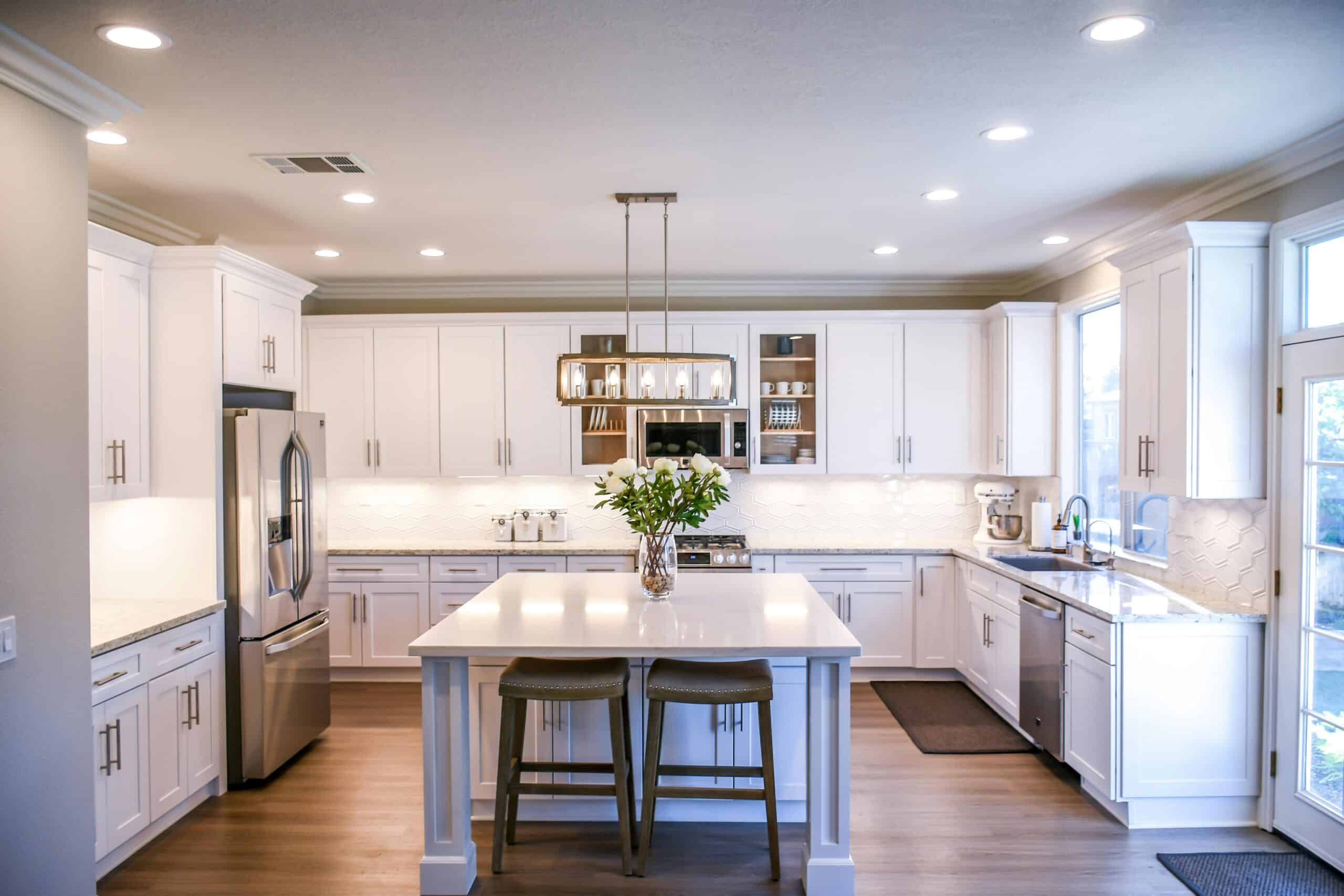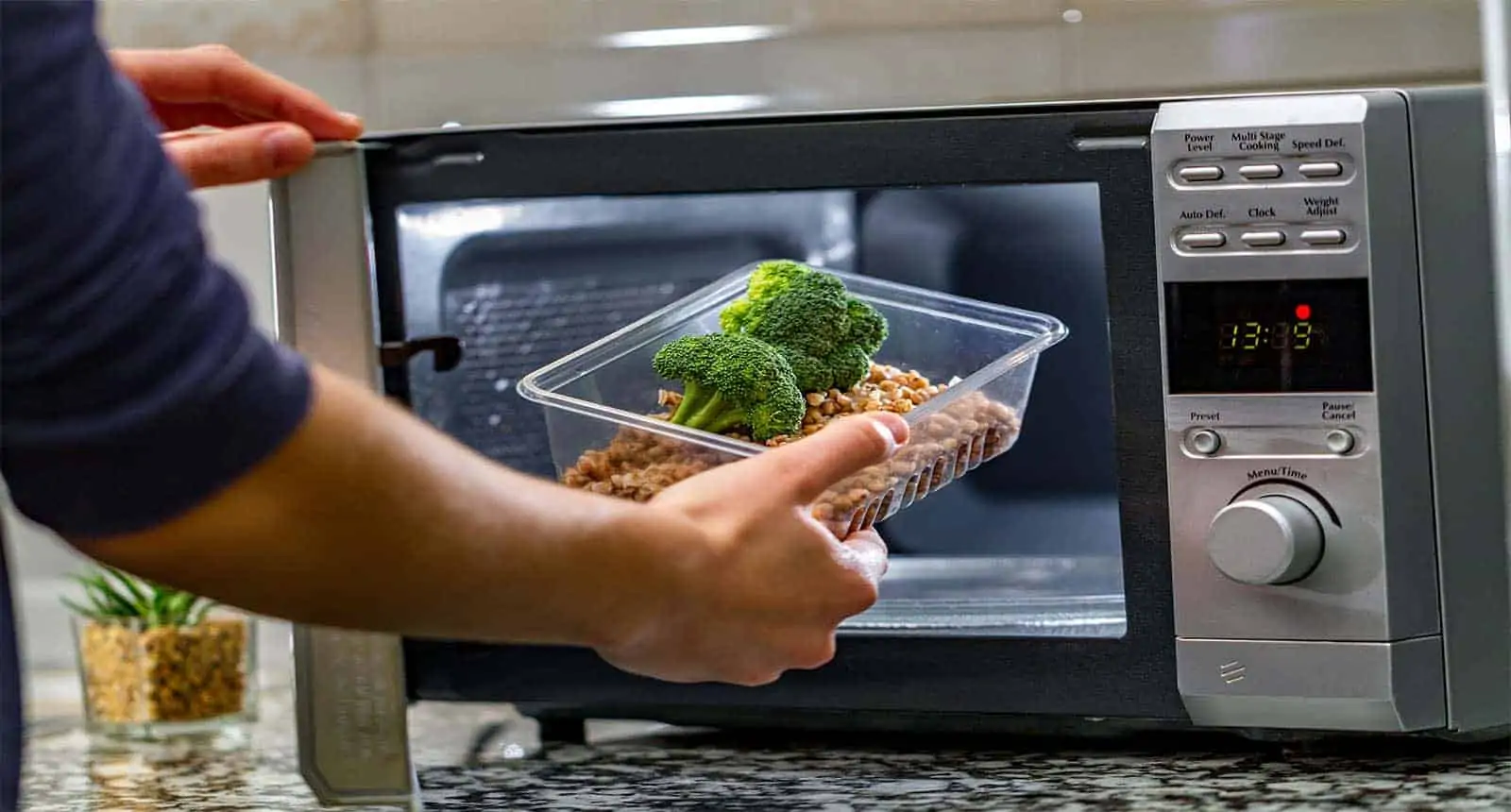Are you embarking on a kitchen renovation or building your dream home? If so, you're considering the options for countertops and looking for an attractive and durable option to finish this important space. Granite and quartz offer unique benefits and some downsides – but which is better overall?
We'll explore the differences between granite and quartz countertops to help make it easier for you to select the ideal material for your new kitchen. Read on to uncover more about each type of countertop, including their distinctive qualities and implications in terms of cost.
Let's get started!
1. Basics of Granite and Quartz Countertops
The main difference between quartz and granite countertops is their composition. Granite is a natural stone composed of interlocking mineral crystals, while quartz countertops are man-made, consisting of 95% ground quartz and 5% resin binders and pigments.

Image credit: archify.com
Granite is much harder than quartz and has more variation in pattern and color, while quartz is easier to maintain but offers less variation in appearance. Granite is a dense material that is heat resistant and provides great scratch resistance. Quartz countertops, on the other hand, are engineered materials comprised of resins and crushed stones.
Quartz offers an attractive finish with little maintenance required. If you're living in a big city, look for countertop installation services, they'll help you choose the ideal granite or quartz option based on your lifestyle needs.
2. Durability and Maintenance of Each Material
Both granite and quartz countertops are strong and suitable for kitchens. With proper maintenance, granite can last a lifetime, while some quartz manufacturers offer lifetime guarantees on their surfaces.
The main difference between the two surfaces is their ability to resist damage. Granite has natural flaws that can weaken in certain places over time and cause cracking or chipping. Quartz does not have such flaws as they are engineered out of it, making it harder and more durable than granite. Quartz is also one of the most hardened minerals in the world — harder than diamonds.

Image credit: alleanzaquartz.com
However, rare manufacturing mistakes may lead to similar problems as granite's natural flaws could cause. To avoid issues, purchase granite or quartz from a reputable seller with good guarantees.
Quartz is often considered more heat- and scratch-resistant than granite. However, neither surface will be easy to scratch or damage with heat during general use. But when it comes to spills and staining, quartz is much more resistant than granite due to its non-porous surface, which won't absorb liquids that quickly, resulting in permanent staining, while granite, being porous, requires sealing regularly to prevent permanent staining.
3. Design Characteristics and Aesthetic Differences Between Granite and Quartz
While both materials offer unique designs and aesthetic qualities, they vary in several ways. Granite provides an earthy, natural feel with different veining, colorways, and mineral deposits that add visual interest, while quartz boasts contemporary vibes and offers uniform patterns in lighter colors. Additionally, granite is naturally hard, while quartz is recommended to be treated with a sealant for maximum durability.
Choosing between granite or quartz depends on your preference, budget, and design style - so when looking for answers to your countertop questions be sure to look for cheap quartz countertops for more information.
4. Cost Considerations for Both Materials
The cost of quartz countertops varies depending on the size and complexity of the installation, with larger projects warranting higher labor costs. Additionally, quartz is less dense than granite, making it easier to handle and install. Customizing quartz countertops is an option for those looking for a more personalized touch due to their engineered nature.

Image credit: merrymaids.com
Granite countertops can also be customized to fit unique shapes and sizes, but they are more susceptible to cracking due to their natural stone composition. When it comes to cost per square foot installed, quartz countertops are generally cheaper than granite countertops.
Ultimately, when selecting between quartz vs granite for your kitchen remodel project, consider your budget as well as your lifestyle needs – and if you need help selecting which material is best for you, be sure to look for trusted local professionals for advice.
5. Customization and Installation for Both Materials
When exploring options for the customization and installation of quartz and granite countertops, consider taking advantage of granite remnants. Remnants can help you save time and money, as they offer the same quality work and look as slabs, with the bonus of being conveniently pre-cut into a size that can easily be installed in your kitchen or bathroom.
You can find granite remnants through various online sources to determine if any remnants that fit your specifications are available in your area. Remember that since remnants are generally limited, you should investigate quickly and be ready with measurements of your space to snap them up before someone else does.
6. Heat Resistance Between Granite and Quartz

Image credit: houzz.com
Both quartz and granite countertops offer a certain degree of heat resistance, but there are differences to consider. Granite is naturally heat-resistant and can withstand hot pots, pans, and dishes placed directly on the surface without causing damage.
Quartz countertops, although generally heat-resistant, may be susceptible to thermal shock. Sudden or extreme temperature changes can cause quartz to crack or discolor. It is recommended to use trivets or hot pads under hot items on quartz countertops to prevent any potential damage.
7. Environmental Impact Between Granite and Quartz
Quartz countertops are engineered using a combination of natural quartz crystals and resins. The manufacturing process involves mining and processing the quartz, which can have environmental implications. On the other hand, granite is a natural stone that is extracted from quarries. While the extraction process has an environmental impact, a granite slab is considered a more sustainable option as it is a natural resource.
Additionally, quartz countertops also called engineered stone countertops, can be made using recycled materials, reducing their environmental footprint. It's worth researching the manufacturers' sustainability practices when considering either option.
Best Practices for Selecting the Right Countertop Material
When selecting the right countertop materials for your kitchen, the main things to consider are budget, look, and maintenance.

Image credit: zenstone.co.uk
Granite has become increasingly popular in the last decade due to its durability and distinctive look that can range in color from light cream to dark black. Although granite countertops come in many colors, quartz offers an even broader spectrum, including flecks of glittery metallics embedded into the surface. Additionally, engineered quartz require less upkeep than granite since they're non-porous, making them easier to clean.
Regarding budget, granite is often more expensive due to its natural stone quality, whereas quartz is man-made, so it tends to be slightly cheaper. Still, both options can consist of costly installation fees depending on the shape and size of your kitchen.
Ultimately, to select the perfect countertop for your kitchen, you should prioritize the most important features while considering any potential costs associated with the installation or material selection.
To Sum Up
If you're looking for an eye-catching natural stone with a luxurious feel, your choice is granite. If lower maintenance and longer-lasting durability are more important to you, quartz is a better option. And regardless of which natural materials you choose, it's essential to remember that there are better choices than the most expensive option for your kitchen. Do your research and carefully weigh each choice before deciding what material you should use for your home.
Frequently Asked Questions on Granite and Quartz Countertops
a) Do granite or quartz countertops help with the resale value of your home?

Image credit: rehabfinancial.com
Granite and quartz countertops are two popular choices for homeowners due to their durability, aesthetic appeal, and potential to increase the resale value of a home. While it is hard to quantify precisely how much value these countertops add, they are generally considered attractive features that can positively impact a home's appeal to potential buyers.
Both quartz and granite countertops have their advantages regarding resale value. They can enhance a kitchen's visual appeal and functionality, often considered key home selling points. Buyers are often attracted to upgraded features and premium materials, and having quartz and granite countertops can make a positive impression during a showing or open house.
It is worth noting that the overall impact of countertops on resale value will depend on factors such as the location, condition, and overall quality of the home. While quartz and granite countertops are generally well-regarded, it is essential to consider the broader context of the home and its market.
b) Which is easier to clean, quartz or granite?
When it comes to cleaning, both quartz and granite have their advantages and considerations. However, quartz tends to be easier to clean than granite due to its non-porous nature.
Quartz does not have natural pores; hence it is less likely to absorb spills or liquids that can lead to stains or bacterial contamination. As a result, cleaning black quartz countertops is relatively straightforward and typically requires mild soap or detergent and water. Wiping the surface with a soft cloth or sponge is usually sufficient to remove most dirt, grime, and spills.
On the other hand, granite has a porous surface, which means it has tiny microscopic openings that can absorb liquids if not properly sealed. If a spill occurs on granite slabs, particularly substances like red wine or oils, cleaning it promptly to avoid staining is essential. Regular sealing of granite surfaces is recommended to reduce their porosity and make them more resistant to staining.

Image credit: distinctivekitchen.com
Cleaning granite typically involves using mild cleaners specifically formulated for stone surfaces and avoiding harsh chemicals or abrasive cleaning tools that could damage the surface. Avoiding prolonged exposure to acidic substances, such as vinegar or citrus juices, and using cutting boards or hot pads to protect the surface from scratches and heat are recommended for both materials.
c) Does quartz scratch easier than granite?
Quartz countertops are known for their exceptional hardness and resistance to scratches and chips. While they are not completely scratch-proof, quartz surfaces are highly resistant to most common household scratches, such as those caused by knives, utensils, and daily wear and tear. However, excessive force or using sharp objects directly on the surface can cause scratches.
On the other hand, granite is a very hard material, but it is more scratch-resistant than quartz. Depending on the mineral composition and quality of the granite, it may be more susceptible to scratches than quartz. Additionally, some types of granite may have naturally occurring fissures or softer minerals that can be more prone to scratches.














